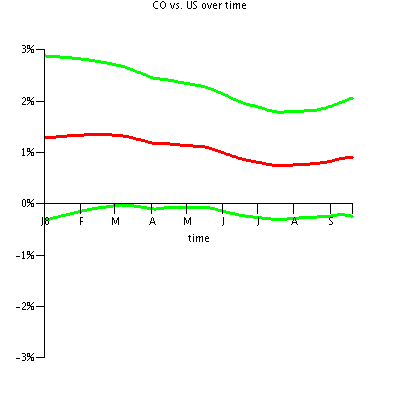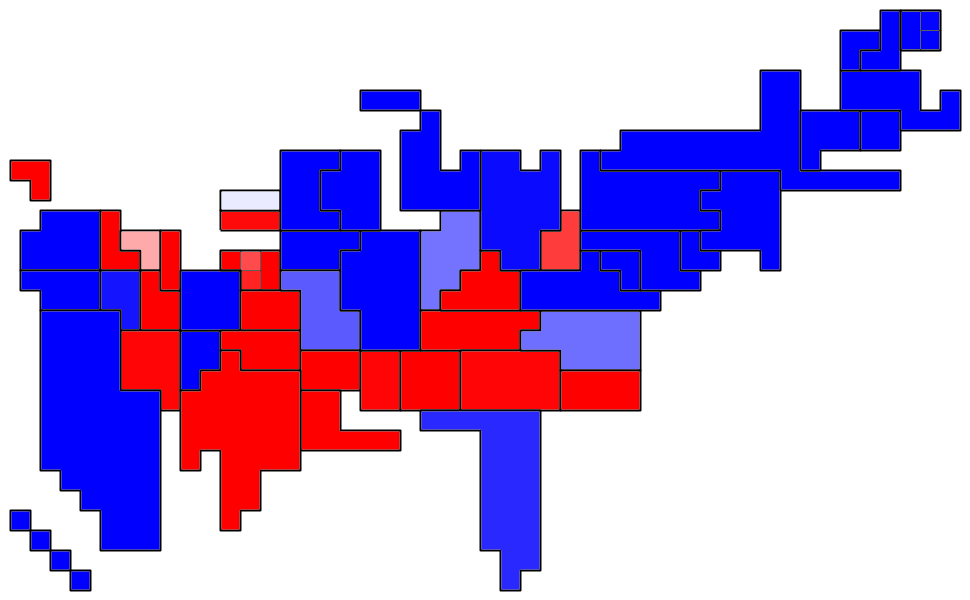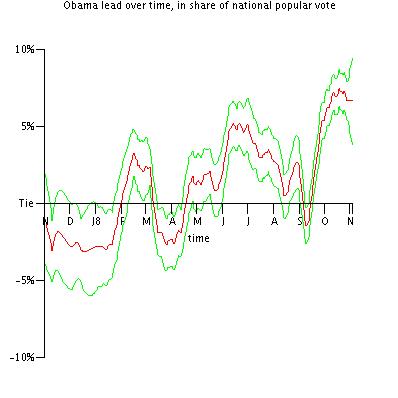Colorado Colorado Colorado
If you locked me in a room until election night, and then made me guess the electoral winner using only the knowledge of one state's winner or the national popular winner, the question I would ask is not "Did Obama win the national popular vote?" The question I would ask is "Did Obama win Colorado?" That's how important I think CO is.
For some time now, CO has been at the top of my list of swing states, with only MI occasionally appearing to be nearly as important. Because the blue-to-red ranking of states is highly stable, and because CO is currently the clear electoral tipping point with only six weeks left to go, I've argued here, in a comment here that there is a small number of states that matter, and that CO is at the top of that heap.
It's nice to see the conventional wisdom and top-shelf bloggers are advertising the importance of CO, and that the Obama campaign is putting offices throughout CO.
Here's a graph of how much Obama's lead in CO exceeds his national lead, over time throughout 2008, with 3σ confidence bounds. Polls were infrequent early in the year, but it's clear that Obama picked up about 0.25% in CO relative to the US recently (probably because of the Denver convention). This is a big deal, because it gives Obama a slight advantage in the electoral college. Recall that Kerry had a slight advantage in the electoral in 2004, but that the electoral college has looked neutral to me, because of Obama's huge gains in deep-red western states. Now Obama has roughly a 70-80% chance of winning an election if the national vote is tied, which translates roughly into a 4% extra chance of victory. In other words, the fact that the Democrats held their convention in Denver gives them a 4% extra probability of winning, compared to holding their election in a random spot. Combine this with the tepidity of CO Republicans toward McCain, and we could easily be headed for an Obama electoral win even if McCain wins the national popular vote.

By contrast, the Republicans made even better gains this summer in MN relative to the whole country, which doesn't matter because MN is not a swing state. Both parties made pretty ballsy guesses about which states would become swing states; the Democrats guessed right, the Republicans wrong.
Off topic, but I was surprised that McCain does not have offices in the areas of Maple Grove or Woodbury, MN. MN was a state that the Republicans wanted to pick up, right? And the burgeoning NW and E suburbs and exurbs are natural places for Republicans to organize, right?



2 Comments:
Too bad it'll boil down to one of the weirder states in the union. CO is right up there with FL, NV, and AK for sheer lunacy.
The current system does not reliably reflect the nationwide popular vote. The statewide winner-take-all rules makes it possible for a candidate to win the Presidency without winning the most popular votes nationwide. This has occurred in one of every 14 presidential elections.
In the past six decades, there have been six presidential elections in which a shift of a relatively small number of votes in one or two states would have elected (and, of course, in 2000, did elect) a presidential candidate who lost the popular vote nationwide.
Nationwide popular election of the President is the only system that makes all states competitive, guarantees that the candidate with the most popular votes nationwide wins the Presidency, and makes every vote equal.
The National Popular Vote bill would guarantee the Presidency to the candidate who receives the most popular votes in all 50 states (and DC).
Every vote would be politically relevant and equal in presidential elections.
The bill would take effect only when enacted, in identical form, by states possessing a majority of the electoral votes—that is, enough electoral votes to elect a President (270 of 538). When the bill comes into effect, all the electoral votes from those states would be awarded to the presidential candidate who receives the most popular votes in all 50 states (and DC).
The National Popular Vote bill has passed 21 state legislative chambers, including one house in Arkansas, Colorado, Maine, North Carolina, and Washington, and both houses in California, Hawaii, Illinois, New Jersey, Maryland, Massachusetts, Rhode Island, and Vermont. The bill has been enacted by Hawaii, Illinois, New Jersey, and Maryland. These four states possess 50 electoral votes — 19% of the 270 necessary to bring the law into effect.
See http://www.NationalPopularVote.com
susan
Post a Comment
<< Home